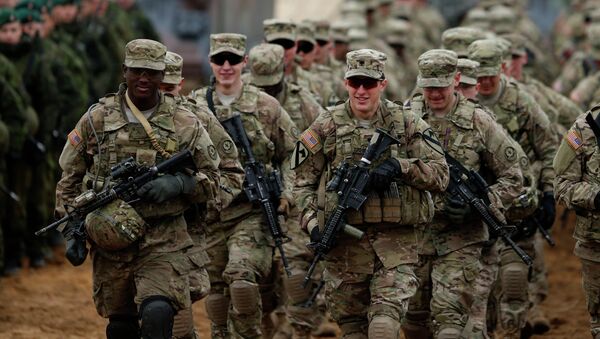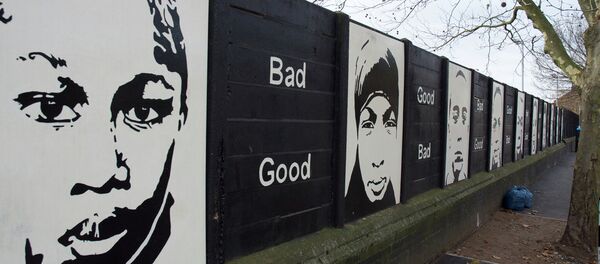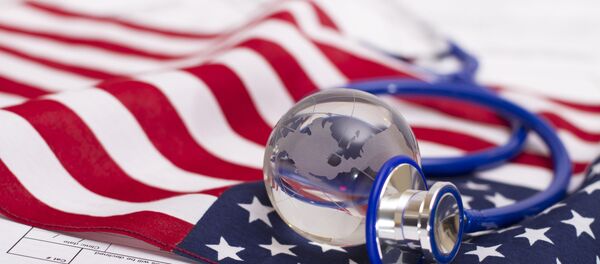“The fact that your poll shows that 46% of the public sees a problem with heavily militarized police indicates that almost half of the public sees beyond war as a solution to our problems,” Robert Koehler, an award-winning journalist and author of “Courage Grows Strong at the Wound” told Sputnik.
According to the ICM Research poll conducted exclusively for Sputnik news agency, 48 percent of Americans want policemen to carry more military equipment, while 46 percent were in favor of less heavily-armed police officers, and five percent were undecided.
“Of course, many of those opposed to militarized police also are direct victims of racial profiling and other aspects of institutional racism in our punitive justice system,” Koehler said.
The War on Drugs in the 1980s and the War on Terror in the early 2000s after 9-11 were periods marked by the rapid militarization of police departments throughout the country, Basil Smikle Jr., president and founder of Basil Smikle Associates consulting firm told Sputnik.
He went on to say that the events in Ferguson, where a police officer shot an unarmed 18-year-old African-American teenager Michael Brown in August 2014, “demonstrate how that weaponry, used against American citizens, can be viewed as heavy-handed and antithetical to our beliefs about government’s role in US society.”
“I'm actually encouraged that the split is almost 50-50. I often fear that those who see that an armed response to what they fear only makes matters worse are a far smaller percentage of the population,” Robert Koehler said.
Koehler added that the killing of Michael Brown did not change public opinion in the United States, but instead brought “dormant issues to the forefront of public life.” He pointed out that a large part of the American public is looking for a scapegoat to hang all America’s problems on.
“The debate over whether the police officer was justified or not tapped into a deep part of people's identities. We identify ourselves in large part by whom we consider ‘the enemy’. The Ferguson incident brought that sense of ‘the enemy’ to the front pages of American life. It hasn't been there so vividly since the civil rights movement,” Koehler explained.
Basil Smikle stressed that the events in Ferguson, in New York where the 43-year Eric Garner died in July 2014 after a police officer put him in a chokehold, and other incidents like Trayvon Martin, who was fatally shot in 2012 by a neighborhood watch captain in Florida, “heighten the historical racial divide in the country at a time when tremendous income inequality is at its height.”
The ICM opinion poll found that people of African-American and Asian heritage made up the majority of those strongly opposed to police using heavier weapons. As many as 53 percent of respondents of African and 68 of Asian descent said they did not want better armed police officers protecting their lives, in comparison to 45 percent of respondents with European roots.
“It's called racism — especially, of course, for African-Americans. They have good reason to be scared of the police. If police are militarized, it means they consider the communities they serve as war zones. And people of color, or of different ethnic backgrounds, will be the enemy,” Koehler told Sputnik.
According to the poll, 68 percent of Americans of both African and European ancestry said disagreements based on grounds of race, color or ethnic origin still matter and pose a major problem for the country, which has long praised itself on being a “melting pot” for peoples who flocked to the country in search of greater freedom.
“I'm surprised the number isn't much higher,” Robert Koehler said. “America remains an immature society. Most people still require an enemy in order to believe in their own self-worth, and racial divisions are the most convenient way to create that enemy. Plus, of course, America has a history of institutional racism (slavery, the "Indian wars") for which it has not atoned. Until we face the harm we've done in building this nation, those divisions will remain active.”
Racism and discrimination on ethnic grounds in the United States came to the fore in nationwide debates following accusations of racial profiling. White US police officers have been blamed for allegedly targeting people from ethnic minorities for stop-and-frisk searches.
The problem took on an entirely new dimension when white police officers shot and killed several unarmed African-American people, including a teenager, in 2015.





